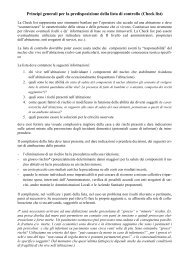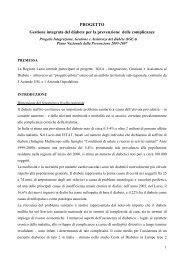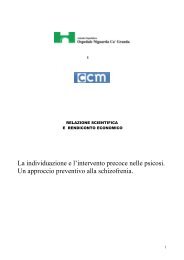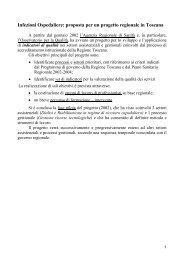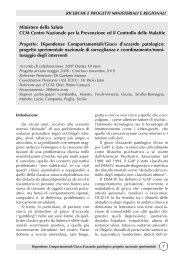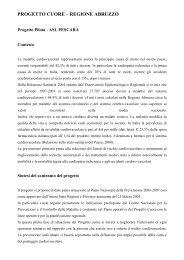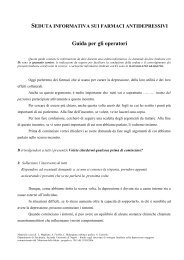Gaining health : analysis of policy development in European ...
Gaining health : analysis of policy development in European ...
Gaining health : analysis of policy development in European ...
Create successful ePaper yourself
Turn your PDF publications into a flip-book with our unique Google optimized e-Paper software.
Chapter 5<br />
216<br />
through consensus build<strong>in</strong>g. This was facilitated by the small<br />
population <strong>of</strong> the country and easy relationships between<br />
people <strong>in</strong> power, and strengthened by public confidence <strong>in</strong><br />
experts and bureaucrats. The commonly agreed values <strong>of</strong><br />
the Nordic welfare model provided a clear framework for<br />
<strong>policy</strong>-mak<strong>in</strong>g. Active participation <strong>in</strong> strategically selected<br />
<strong>in</strong>ternational networks opened up opportunities for shar<strong>in</strong>g<br />
experiences.<br />
France is one <strong>of</strong> the largest and most developed countries<br />
<strong>in</strong> the EU, where present <strong>in</strong>stitutions are significantly<br />
<strong>in</strong>fluenced by deep historical roots. The overall characteristics<br />
<strong>of</strong> French public adm<strong>in</strong>istration are clearly reflected <strong>in</strong><br />
the structures and processes <strong>of</strong> NCD <strong>policy</strong> <strong>development</strong><br />
based on the balance, with<strong>in</strong> def<strong>in</strong>ed boundaries, <strong>of</strong> <strong>in</strong>terrelationships<br />
between multiple stakeholders. The relatively<br />
limited <strong>in</strong>fluence <strong>of</strong> <strong>in</strong>ternational factors <strong>in</strong> French <strong>health</strong><br />
<strong>policy</strong> <strong>development</strong> reflects the historical and cultural traditions<br />
<strong>of</strong> the country.<br />
Greece also went through rapid economic <strong>development</strong><br />
and political trauma <strong>in</strong> the second half <strong>of</strong> the twentieth<br />
century. Social <strong>development</strong>, <strong>in</strong>clud<strong>in</strong>g modernization <strong>of</strong><br />
public adm<strong>in</strong>istration, <strong>development</strong> <strong>of</strong> the education system<br />
and a culture <strong>of</strong> negotiation and collaboration, does not appear<br />
to have kept pace with economic growth. Apart from<br />
areas such as nutrition, <strong>in</strong>ternational l<strong>in</strong>ks are not strong but<br />
the EU environment is gradually chang<strong>in</strong>g the <strong>policy</strong>-mak<strong>in</strong>g<br />
scene.<br />
Health <strong>policy</strong> <strong>development</strong> <strong>in</strong> Hungary is <strong>in</strong>fluenced by the<br />
transition to a market economy and democracy. The historical<br />
changes and the EU accession process were controversial,<br />
creat<strong>in</strong>g a sharp political divide and <strong>in</strong>creas<strong>in</strong>g <strong>in</strong>equities.<br />
Slow economic growth, the alarm<strong>in</strong>g budget deficit and high<br />
external debt limit the Government’s freedom <strong>of</strong> action<br />
and impose restrictive measures <strong>in</strong> the public services, <strong>in</strong>clud<strong>in</strong>g<br />
public <strong>health</strong>. The country is go<strong>in</strong>g through a radical<br />
<strong>health</strong> care reform, creat<strong>in</strong>g passionate debate and marg<strong>in</strong>aliz<strong>in</strong>g<br />
other strategic <strong>health</strong> issues. Simultaneously, the EU<br />
<strong>in</strong>tegration process, <strong>in</strong>clud<strong>in</strong>g the use <strong>of</strong> structural funds,<br />
<strong>of</strong>fers a w<strong>in</strong>dow <strong>of</strong> opportunity for l<strong>in</strong>k<strong>in</strong>g NCD <strong>policy</strong> and<br />
<strong>development</strong>.<br />
Ireland has totally redef<strong>in</strong>ed itself with<strong>in</strong> a few years, from<br />
be<strong>in</strong>g a small, relatively poor agricultural country to becom<strong>in</strong>g<br />
one <strong>of</strong> Europe’s fastest grow<strong>in</strong>g and globalized economies.<br />
This was facilitated by social agreements between the<br />
state and trade unions, aga<strong>in</strong> creat<strong>in</strong>g a level <strong>of</strong> consensus<br />
build<strong>in</strong>g. Efforts to reduce poverty and social exclusion <strong>of</strong>fer<br />
<strong>in</strong>tervention po<strong>in</strong>ts for <strong>health</strong> promotion.<br />
Opportunities for NCD <strong>policy</strong> <strong>development</strong> <strong>in</strong> the newly<br />
<strong>in</strong>dependent Kyrgyzstan are closely l<strong>in</strong>ked to the economic<br />
and political processes <strong>of</strong> transition. In the context <strong>of</strong><br />
strik<strong>in</strong>g poverty and under<strong>development</strong>, <strong>in</strong> a complicated<br />
geopolitical situation, <strong>in</strong>novative approaches and strategic<br />
th<strong>in</strong>k<strong>in</strong>g are <strong>of</strong> outstand<strong>in</strong>g importance. In these conditions,<br />
the <strong>in</strong>ternational community has a special responsibility to<br />
support key <strong>development</strong>al issues <strong>in</strong> the country.<br />
In Lithuania, <strong>in</strong>dependence provided an opportunity for<br />
totally reth<strong>in</strong>k<strong>in</strong>g <strong>health</strong> <strong>policy</strong>, based on a strong consensus<br />
around WHO Health for All values. Strong <strong>in</strong>ternational<br />
l<strong>in</strong>ks were already <strong>in</strong> place and were put to good effect.<br />
In recent years, solid economic growth and <strong>health</strong>y public<br />
f<strong>in</strong>ances have created a positive climate and enabled structural<br />
reforms.<br />
Types <strong>of</strong> <strong>policy</strong> – patterns <strong>of</strong> <strong>policy</strong><br />
<strong>development</strong><br />
As reflected <strong>in</strong> <strong>Ga<strong>in</strong><strong>in</strong>g</strong> <strong>health</strong> (1), WHO’s <strong>European</strong> NCD<br />
Strategy, there is broad discussion throughout Europe on<br />
tackl<strong>in</strong>g NCD. Key questions <strong>in</strong>clude the appropriateness<br />
<strong>of</strong> tackl<strong>in</strong>g <strong>in</strong>dividual lifestyle factors separately or whether<br />
changes <strong>in</strong> different aspects <strong>of</strong> behaviour are so <strong>in</strong>terl<strong>in</strong>ked<br />
that they can only be effectively tackled together; and<br />
Reflections on experiences



